
Vodka is a clear distilled alcoholic beverage. Different varieties originated in Poland, Russia, and Sweden. Vodka is composed mainly of water and ethanol but sometimes with traces of impurities and flavourings. Traditionally, it is made by distilling liquid from fermented cereal grains, and potatoes since introduced in Europe in the 1700s. Some modern brands use corn, sugar cane, fruits, honey, and maple sap as the base.
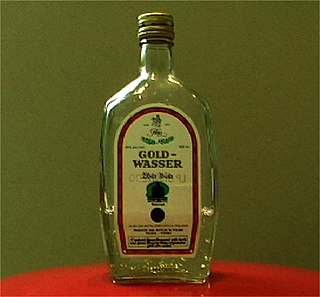
Goldwasser, pol. Wódka Gdańska, with Goldwasser as the registered tradename, is a strong root and herbal liqueur which was produced from 1598 to 2009 in Gdańsk. Production now takes place in Germany.
Apéritifs and digestifs are drinks, typically alcoholic, that are normally served before (apéritif) or after (digestif) a meal respectively.

Liquor is an alcoholic drink produced by the distillation of grains, fruits, vegetables, or sugar that have already gone through alcoholic fermentation. Other terms for liquor include: spirit, distilled beverage, spirituous liquor or hard liquor. The distillation process concentrates the liquid to increase its alcohol by volume. As liquors contain significantly more alcohol (ethanol) than other alcoholic drinks, they are considered "harder." In North America, the term hard liquor is sometimes used to distinguish distilled alcoholic drinks from non-distilled ones, whereas the term spirits is more commonly used in the UK. Some examples of liquors include vodka, rum, gin, and tequila. Liquors are often aged in barrels, such as for the production of brandy and whiskey, or are infused with flavorings to form flavored liquors, such as absinthe.

Advocaat or advocatenborrel is a traditional Dutch alcoholic beverage made from eggs, sugar, and brandy. The rich and creamy drink has a smooth, custard-like consistency. The typical alcohol content is generally between 14% and 20% ABV. Its contents may be a blend of egg yolks, aromatic spirits, sugar or honey, brandy, vanilla, and sometimes cream. Notable makers of advocaat include Warninks, Bols, Darna Ovo Liker, DeKuyper, and Verpoorten.

Krupnik or Krupnikas (Lithuanian) is a traditional sweet alcoholic drink similar to a liqueur, based on grain spirit and honey, popular in Poland and Lithuania. In Poland it is grouped in the nalewka category of alcoholic beverages. Mass-produced versions of krupnik consist of 40–50% alcohol, but traditional versions will use 80–100% grain alcohol as the base. Honey, usually clover honey, is the main ingredient used to add sweetness, as well as up to 50 different herbs. There are many versions and some recipes have been passed down through generations; producers typically use their own recipes.

Starka is a type of distilled alcoholic beverage made from fermented rye mash. Traditionally Starka is made from natural rye spirit and aged in oak barrels with small additions of linden-tree and apple-tree leaves. The methods of production are similar to those used in making rye whisky. Sold in various grades, the most notable difference between them is the length of the aging period, varying from 3 to over 50 years, and the natural colour which is obtained from the reaction between the alcohol and the oak barrel, not from the additives.
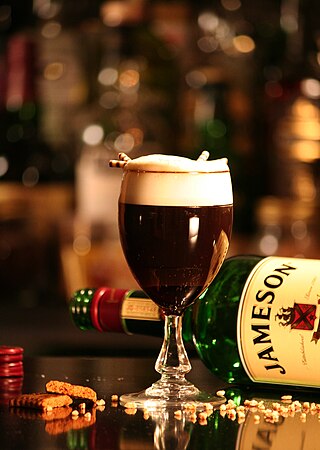
A liqueur coffee is a caffeinated alcoholic drink that consists of a shot of liqueur, mixed with coffee. It is typically served in a liqueur glass, often accompanied with cream and sugar. Coffee liqueur beverages are served in different fashions and can be found throughout many countries. One of the most popular liqueur coffee beverage is commonly known as Irish coffee. Liqueur coffee beverages are largely classified as cocktails as well as digestifs which are aimed at aiding the digestive process typically after a meal.
Veresk is an alcoholic drink producing company. It is located in Kashin, Russia in the Tver Oblast.
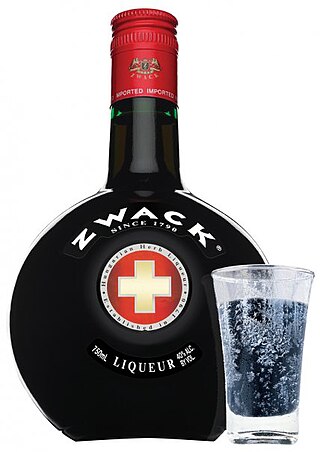
Zwack is a Budapest, Hungary based company that makes liqueurs and spirits. The company produces an 80 proof herbal liqueur known as Unicum from a secret blend of more than forty different herbs and spices. Unicum is known as one of the national drinks of Hungary.
Badel 1862 d.d. is a Croatian alcoholic beverage company headquartered in Zagreb.
An astro pop cocktail is a layered cocktail, mixed drink or shooter so named because it resembles the Astro Pop lollipop candy brand. Various recipes exist that use liquor and liqueurs to produce the drink. A version of the drink exists that is layered with red, white, and blue colors and served in a shot glass. It is a popular alcoholic beverage in some drinking establishments.
Cinnamon liqueur may refer to one of several brands of alcoholic beverages.
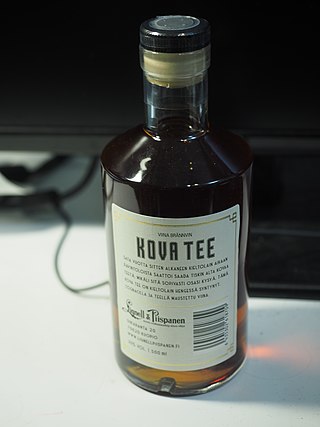
Lignell & Piispanen (L&P) is a Finnish company from Kuopio, manufacturing alcoholic beverages. Its parent company Oy Gust. Ranin was founded in 1852 and the trademark and products of Lignell & Piispanen were merged into it in 1932.
The 2017 A Lyga was the 28th season of the A Lyga, the top-tier association football league of Lithuania. The season began on 3 March 2017 and ended on 19 November 2017.
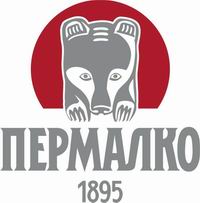
Joint-Stock Company Permalko is one of the leading distilleries in Perm and Perm Kray. The company is in the top 20 list of vodka and spirits producers in Russia.
2019 Lithuanian Football Cup, SHARP LFF Cup was the 31st independent Lithuania and the 74th overall national football cup tournament.











